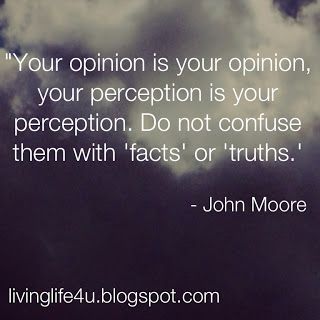When do we start forming personal opinions and judgments? We started doing this from an early age and built them according to our environment and ourselves. An opinion is defined as an idea, judgment, or concept that a person has or is formed about something or Opinions are respectable and their heterogeneity is an undeniable source of wealth and inspiration for creativity.
By listening to what others think and say, we have the opportunity to reflect on other possible points of view. And we said think because that does not mean that all opinions are true! These are only personal judgments, with no guarantee of validity, both those of others and ours. In this sense, opinions always have a point of subjectivity.
“The serene reason avoids extremism and desires moderate caution. –
That is why it is so important to differentiate opinions from statements based on proven facts, those truths that can be verified (not argued). An opinion is not a truth, it is not possible to express an opinion. Opinion may be more or less well-founded, more or less argued; on the other hand, forming an opinion on people or situations slightly promotes different levels of injustice that do not have a solid foundation and do not have a valid basis either.
It is very important to know that our minds are working with the information available to us at all times, so opinions defined and launched with little information often do not survive a debate in which we use strong arguments. In any case, we must not forget, contrary to what we all think at some point, that changing our minds when there are strong arguments that lead us to it is an intelligent attitude.
Another consequence of seeing opinions as what they are, a vote of confidence that always carries a certain risk, is caution in making their own opinion, people who see them often collect a good amount of information before sharing their opinions, just as they tend to listen carefully to other people’s arguments.
Separating opinions from statements is essential. If we do not, the consequences will not be pleasant and in many situations these opinions or how to express them in the form of statements can and often hurt. Hence the importance of this concept: opinions are often used as truths, forgetting that they are personal judgments.
L. Austin, in “The Theory of Speech Acts”, differentiates two territories: the territory of the affirmations and the territory of the statements. Opinions (personal judgments) are part of the territory of the statements. A territory that is linked to validity and coherence. , not to truthfulness. The certainty of being true and being right in this territory is a trap!An illusion or a mirage, as you can see in a desert. Also, it doesn’t usually leave room for other ways of thinking (mental models). or develop the openness of the mind, preventing us from realizing that personal experience is a conditioned reality.
People assume that reality has to adapt to what they perceive, so that others perceive the same thing. In any case, if they don’t, they would be distortions in their perception, never ours. These people become “sincericides”, they give their opinion without being asked, using as an excuse the abused sincerity that is placed as a virtue to commit “sincericides”. How many sincericides impose their truth!
In this way, they find themselves trapped in this impasse that prevents the adoption of other forms of thought (mental models). Do they need reasons to feel safe and protected?This need, which sometimes becomes imperative and causes rational disagreements to become very lively and meaningless discussions.
Why is it necessary to continually reaffirm our views?When the only thing that happens often is that we change our minds about something or someone, giving a good sign of our flexibility and openness, and being consistent with the new information we receive. A simple change of mindset will make us stop being who we are!
On the other hand, it is possible to share opinions, thoughts and thoughts, but not for that reason, we simply share the same view on certain topics, it can be more or less coherent, they can be more or less valid opinions. ? But let’s not fall into the trap of thinking that any opinion, assumption or prediction is more real than another!Thus, Steve Jobs, in his famous speech at Stanford University in 2005, said:
“Don’t get caught up in the dogma of living with the results of other people’s thoughts. Don’t you let the noise of other people’s opinions drown out your own inner voice?-Steve Jobs-

